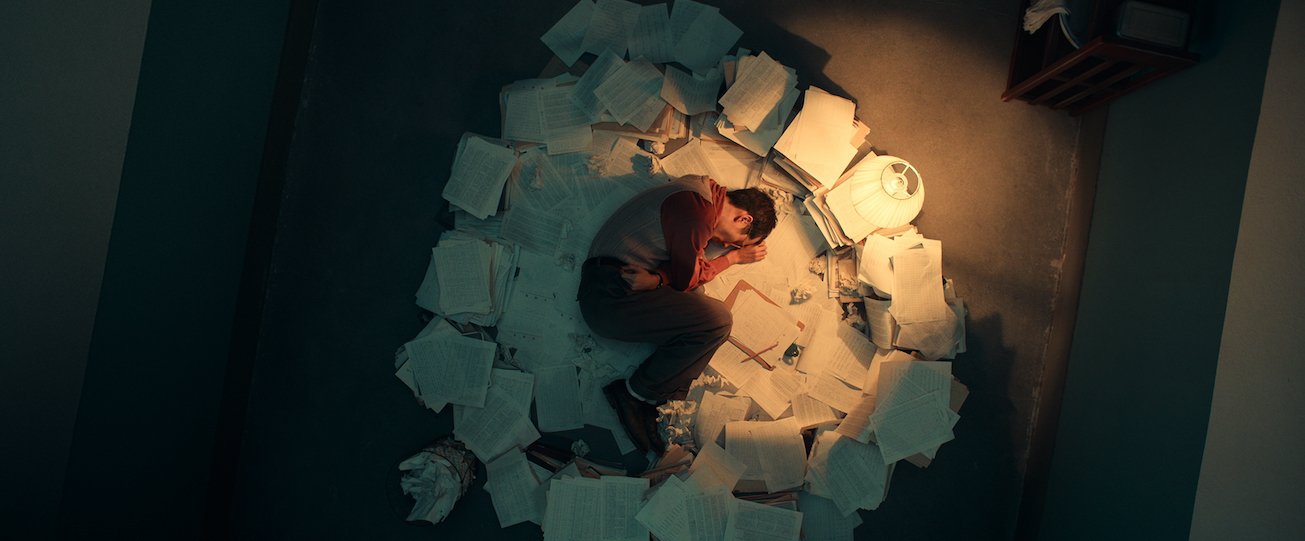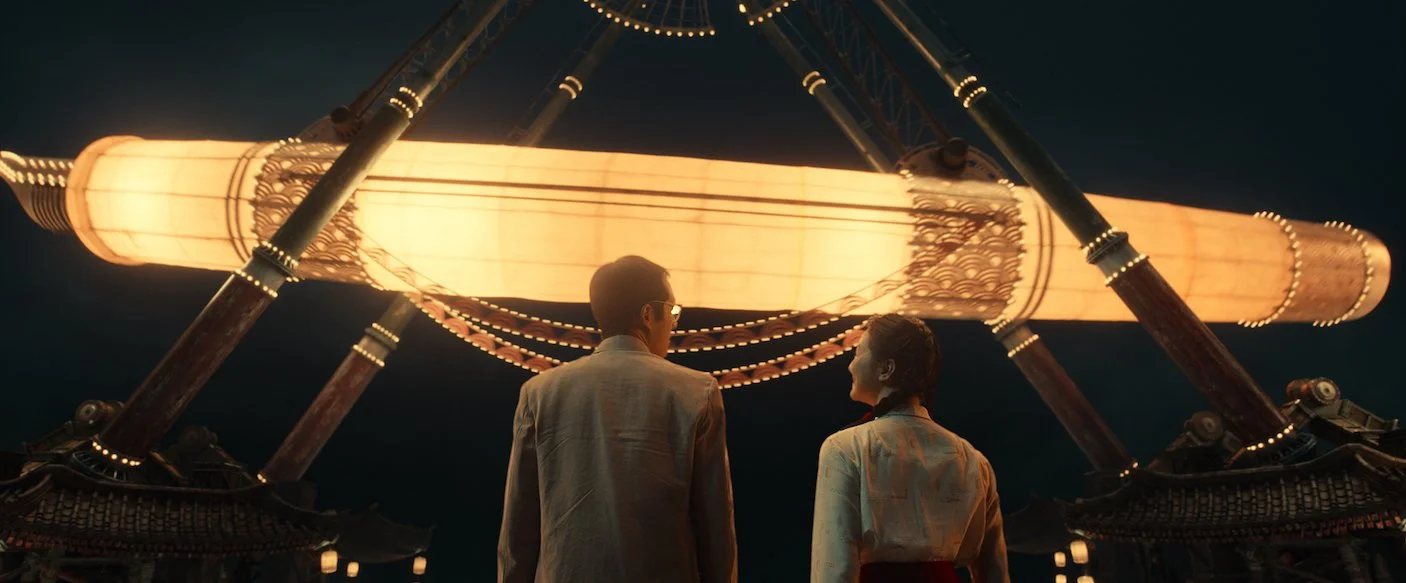An Enigma
Chen Sicheng pivots from light comedy to historical drama, leaving a mystery in his wake.
Decoded
Director: Chen Sicheng • Writers: Chen Sicheng, Christopher MacBride, based on the novel by Mai Jia
Starring: Liu Haoran, John Cusack, Chen Daoming, Daniel Wu, Ren Luyao
China • 2hrs 38mins
Opens Hong Kong Sep 26 • IIA
Grade: C+
I’m sensing a pattern this week. First, The Chronicles of Libidoists makes sex, and more sex, dead dull. Now, Decoded | 解密 makes the art of wartime and Cold War code-breaking dead dull. How are either of these things possible?
Well, in the case of writer-director-co-star Chen Sicheng’s (all three Detective Chinatowns, Lost in the Stars) exhausting mathematical epic, it’s thanks to an era of hazy, unfocused international geopolitics – hazy as in it’s impossible to set a timeframe other than between the 1930s and the 1970s – and some of the worst wig work of the year. At times recalling John Nash in A Beautiful Mind, Srinivasa Ramanujan (who gets a shout-out here) in The Man Who Knew Infinity and Alan Turing in The Imitation Game, the central tortured genius in Decoded is the painfully awkward and nearly 100% agency-free mathematical wunderkind Rong Jinzhen (Liu Haoran, The Breaking Ice), who winds up working for the government breaking international encryption keys so they can spy on everyone like everybody else does. Liu, who also co-starred in the Chinatown franchise, reteams with Chen for a less goofy and more dramatic tale of Fibonacci sequences, golden spirals, solitary genius and finally madness, is the wrong actor for this kind of heavy lifting, and mostly shuffles around looking either too old or too young for the part, and suffering under an increasingly troubling hairpiece. Frequently leaden where it should be flyweight, Decoded doesn’t have nearly enough espionage antics to justify the title, let alone well over two hours (!) watching a boring dude decipher a series of dreams and telegrams. Also? You will never hear “I Am the Walrus” the same way ever again – especially if you catch a glimpse of subtitles that say “I am the egg guy.” Egg guy? Da fuq?
Beginning just before the Second World War and technically during the invasion and occupation of Manchuria by Japan (I… think), we first meet Jinzhen as an oddball orphan – clearly coded as on the spectrum – left in a shack (what’s that now?) by his Austrian dream interpreter… adoptive father I want to say, and rescued like a puppy by math professor Rong Xioalili, “Lili” (Daniel Wu Yin-cho). He takes him under wing as a… surrogate father, bringing the poor lost lamb into his home with his wife Xiaoning (Yu Feihong) and daughter, Biyu (Chen Yusi). He also sends Jinzhen to university where he’s first expelled then mentored by one Professor Liseiwicz (John Cusack), a Polish Jew (!) in exile from the Nazis in China. They get on like gangbusters, Liseiwicz sneakily teaching Jinzhen about the fine art of fucking with someone, until civil war breaks out and Liseiwicz, Jinzhen, Lili and a mysterious spy-type, Zheng (Chen Daoming, Under the Light, Infernal Affairs III) are forced to choose sides. Jinzhen’s plans to head to MIT with Liseiwicz are scuttled, and he winds up at the shady Section 701 (which unfortunately makes me think of Section 31 on Star Trek, which we could use more of, thanks) as a code breaker. Don’t forget, he’s awkward. So Decoded comes to a screeching halt when he finally discovers girls, chiefly Xiaomei (Ren Luyao), who becomes his wife.
Most of the time, though, Jinzhen is puzzling out, first, the Purple Cipher, then the more complex Black Cipher, which little does he realise was created by his old friend Liseiwicz, now working for the NSA. It’s here the film tries its damnedest to morph into a classic long distance tête-à-tête thriller between Liseiwicz and Jinzhen, replete with assassination attempts, prison stints and game-recognise-game messages. Sadly, it never leans all the way in.
That Decoded isn’t sure what it wants to be is its biggest issue. Is it going for ripper of a political espionage thriller, or a drama about the fine line that separates brilliance from madness? In the former part it’s entirely conventional, not helped in the least when Liu is expected to play the much, much older Jinzhen without old man make-up. This is unconvincing. In the latter it’s schlocky and heavy-handed, with lots of OTT dream images – my favourite is the room-sized WOPR that tells Jinzhen he’ll never understand him, mwahahaha! – Jinzhen jots down in his notebook, which becomes a state secret. They help him decrypt the codes, you see. But that notebook becomes an albatross too. In both cases Liu lacks the gravitas, and straight-up charisma of Russell Crowe, Dev Patel or Benedict Cumberbatch, to carry off either. His disarming nerd energy worked in the Chinatown films. Here it’s anonymising.
Don’t get me wrong. This is not cheap filmmaking. It’s as handsomely mounted as any period epic, if pedestrian in its storytelling and language. Chen and co-writer Christopher MacBride make an attempt to weave more geopolitical backstory into the script – the Kuomintang gets a mention, as does Chiang Kai-shek, the then-emerging tension between the US and communism in Asia and the Cultural Revolution – but by avoiding any kind of timestamp it’s hard to contextualise Jinzhen’s feverish obsession and personal struggle with concepts of nation and patriotism. Or Liseiwicz’s. Or what Zheng’s job is. Or what Cusack is up to other than cashing a (probably) fat cheque and getting a free vacation in Shanghai. His manic performance (fabulous wig work on that prison beard) may be the biggest mystery of all.



